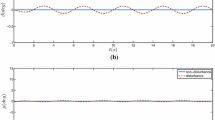Abstract
This paper is concerned with the problem of hypersonic vehicle (HSV) attitude control system in uncertain flight conditions. The problem can be expressed as the adaptive robust control for a class of uncertain nonlinear systems. Based on the description of the aerodynamic structure and the model of flight control system of a certain kind of HSV, the ideal nonlinear generalized predictive control (NGPC) law based on uncertain nonlinear model is raised first to optimize the receding-horizon criterion of tracking errors. Then the online support vector regression (SVR) is employed to identify the uncertain item in the ideal control law. It is the compensating part of the controller. In addition, the stability of the close-loop system is analyzed using the Lyapunov method. The developed control strategy is well-implemented in this HSV attitude control system, and the simulation results compared with both nominal NGPC and RBF neural network disturbance observer show the good robustness and disturbance attenuation ability of this strategy and demonstrate the efficiency of online SVR algorithm.
Similar content being viewed by others
References
Snell S A. Nonlinear dynamic-inversion flight control of supermaneuverable aircraft. PhD Thesis, Minnesota: University of Minnesota, 1991, 10
Zhu L, Jiang C S, Chen H T, et al. Direct adaptive trajectory linearization control of aerospace vehicle using SHLNN (in Chinese). J Astronaut, 2006, 27: 338–344
Huang G Y, Jiang C S, Wang Y H. Adaptive terminal sliding mode control and its applications for UASV re-entry (in Chinese). Control Decision, 2007, 22: 1297–1301
Xu H J, Mirmirani M, Ioannou P. Robust neural adaptive control of a hypersonic aircraft. In: Proc AIAA Guidance, Navigation, and Control Conference and Exhibit. Austin, TX, USA, 2003. AIAA2003-5641
Lu C H, Tsai C C. Generalized predictive control using recurrent fuzzy neural networks for industrial processes. J Proc Control, 2007, 17: 83–92
MartoAnez M, Senent J S, Blasco X. Generalized predictive control using genetic algorithms. Eng Appl Artif Intell, 1998, 11: 355–367
Chen W H, Balance D J, Gawthrop P J. Optimal control of nonlinear systems: a predictive control approach. Automatic, 2003, 39: 633–641
Chen W H. Disturbance observer based control for nonlinear systems. IEEE Trans Mechatr, 2004, 9: 706–710
Kim E. A fuzzy disturbance observer and its application to control. IEEE Trans Fuzzy Syst, 2002, 10: 77–84
Ge S S, Wang C. Adaptive NN control of partially known nonlinear strict-feedback systems. In: Proc American Control Conference. Arlington, VA, USA, 2001. 1241–1246
Cheng L, Jiang C S, Du Y L, et al. The research of SMDO based NGPC method for NSV control system (in Chinese). J Astronaut, 2010, 31: 423–431
Mo L P, Jia Y M, Zheng Z M. Finite-time disturbance attenuation of nonlinear systems. Sci China Ser F-Inf Sci, 2009, 52: 2163–2171
Zhu L. Robust adaptive control for uncertain nonlinear systems and its applications to aerospace vehicles (in Chinese). PhD Thesis. Nanjing: Nanjing University of Aeronautics & Astronautics, 2006, 9
Chen M, Chen W H. Sliding mode controller design for a class of uncertain nonlinear system based on disturbance observer. Int J Adapt Control Signal Proc, 2010, 24: 51–64
Vapnik V. Statistical Learning Theory. New York: John Wiley, 1998
Miao Q, Wang S F. Nonlinear model predictive control based on support vector regression. In: Proc the First International Conference on Machine Learning and Cybernetics. Beijing, China, 2002. 1657–1661
Zhang R D, Wang S Q, Li P. Support vector machine based predictive control for nonlinear systems (in Chinese). Acta Autom Sin, 2007, 33: 1066–1073
Li L J, Su H Y, Chu J. Generalized predictive control with online least squares support vector machines. Acta Autom Sin, 2007, 33: 1182–1188
Ma J, Theiler J, Perkins S. Accurate on-line support vector regression. Neural Comput, 2003, 15: 2683–2704
Parrella F. Online support vector regression. PhD Thesis. Genoa: University of Genoa, 2007, 5
Deng N Y, Tian Y J. Support Vector Machine (in Chinese). Beijing: Science Press, 2009
Shaughnessy J D, Pinckney S Z, McMinn J D, et al. Hypersonic vehicle simulation model: winged-cone configuration. NASA TM-102610, 1990
Tian Y J. Support vector regression and its application (in Chinese). PhD Thesis. Beijing: China Agriculture University, 2005, 6
Chen Y X, Duan C Y. Study on worst case analysis method for flight control system (in Chinese). Acta Aeronaut Astronaut Sin, 2005, 26: 647–651
Author information
Authors and Affiliations
Corresponding author
Rights and permissions
About this article
Cite this article
Cheng, L., Jiang, C. & Pu, M. Online-SVR-compensated nonlinear generalized predictive control for hypersonic vehicles. Sci. China Inf. Sci. 54, 551–562 (2011). https://doi.org/10.1007/s11432-011-4195-x
Received:
Accepted:
Published:
Issue Date:
DOI: https://doi.org/10.1007/s11432-011-4195-x




